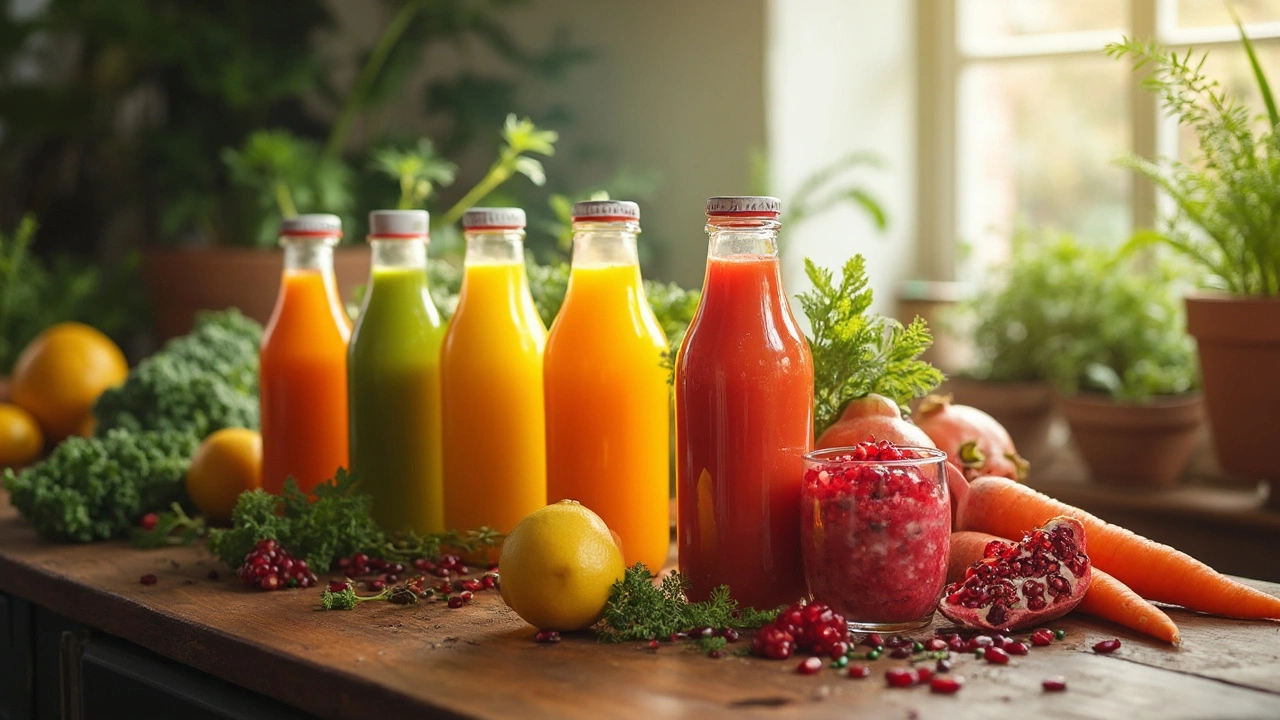Benefits of Juice: Simple Health Wins from Fresh Drinks
Juice can be an easy way to get more nutrients fast. A fresh glass gives vitamins, minerals, and fluid without heavy prep. If you pick the right combos, juice supports energy, digestion, and recovery after workouts.
What you get depends on ingredients. Leafy greens bring vitamin K and folate; citrus adds vitamin C and a tang that masks bitter greens; beets add nitrates that can boost blood flow. A mix of fruit and veg balances sugar with fiber if you keep some pulp.
Watch the sugar. Fruit juice can spike blood sugar if you drink large amounts. Aim for mostly vegetables, a small fruit portion, and add water or ice to stretch a serving. Try a 60–40 veg-to-fruit ratio to keep the taste pleasant and sugar lower.
Timing matters. A glass after a workout helps restore fluids and carbs for muscle recovery. In the morning, juice can kickstart hydration and give a vitamin lift. Avoid swapping juice for whole meals often—use it as a boost, not the whole meal.
Easy juice combos to try: spinach + apple + cucumber + lemon; carrot + orange + ginger; beet + berry + lime. These blends deliver different benefits—antioxidants, anti-inflammatory compounds, and natural electrolytes.
Prep tips that save time: batch-chop veggies and freeze portions, make large pitchers diluted with water, or use a blender and strain less to keep more fiber. Cold-press or centrifugal juicers both work—cold-press keeps more nutrients longer, but a good blender with whole fruits and veggies gives the best fiber.
Who should be careful? People with diabetes, those watching calories, and anyone on certain blood-thinning medications should check with a clinician before adding concentrated juice. Also, whole fruit is usually better for regular snacking because it keeps you fuller longer.
Want to use juice for gut health? Add ginger for digestion, pineapple for bromelain, and a splash of apple cider vinegar for a tangy, gut-friendly kick. Fermented juices like kombucha offer probiotics, but check sugar content.
Storing juice safely: drink fresh within 24–48 hours, keep it cold, and use airtight containers. Small batch juicing reduces waste and keeps flavor bright. If juice smells off or looks cloudy beyond normal, toss it.
Start small: swap one sugary drink a day for a veggie-forward juice, or add a small juice shot to your lunch. Track how you feel—more energy, better digestion, or less midafternoon slump are decent signs it's helping.
Quick Recipes
Spinach apple refresher: 1 cup spinach, half apple, half cucumber, juice of half lemon, water to taste. Carrot ginger boost: 3 carrots, one orange, thumb of ginger. Beet berry recovery: half beet, quarter cup mixed berries, splash of lime, water or coconut water.
Practical Tips
Freeze small portions in ice cube trays for single servings. Carry a small bottle for busy days. If you use a blender, include some pulp and add a spoon of chia for thickness and extra fiber. Rotate ingredients weekly so you don't get bored. Start today, see the difference.

Health Juice: Unpacking the Benefits for a Vibrant Life
Health juices have become a staple for many health enthusiasts, offering a convenient way to consume essential nutrients. Packed with vitamins and antioxidants, these juices can enhance your immune system, improve digestion, and help detoxify your body. Easy to integrate into any lifestyle, health juices come in a variety of flavors and combinations, catering to diverse taste preferences. This guide will delve into the specific benefits and practical tips for making the most of health juices in your daily routine.
Read More